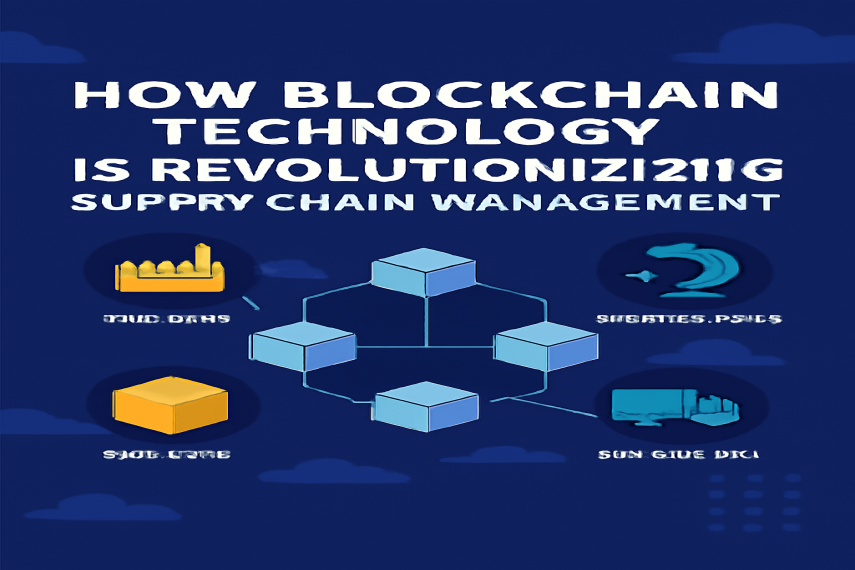
Blockchain technology, primarily known for powering cryptocurrencies like Bitcoin, is rapidly transforming industries beyond finance. One of the most promising applications of blockchain is in supply chain management. By offering decentralized, transparent, and secure solutions, blockchain is revolutionizing the way goods are tracked, verified, and delivered across global supply chains. In this article, we’ll explore how blockchain is improving supply chain operations and why it’s considered a game-changer for businesses worldwide.
Blockchain is a distributed ledger technology (DLT) that records transactions across many computers in such a way that the registered transactions cannot be altered retroactively without the alteration of all subsequent blocks. Essentially, blockchain is a secure, immutable, and transparent system for storing data.
In the context of supply chains, blockchain allows for the seamless and secure transfer of data between parties involved in the supply chain, such as manufacturers, suppliers, and logistics providers, without the need for intermediaries.
Increased Transparency and Traceability
One of the most significant advantages of blockchain is its ability to provide transparency. Every transaction on a blockchain is time-stamped and recorded in a way that’s accessible to all stakeholders in the supply chain. This means that everyone involved—from suppliers to customers—can track the journey of a product in real-time.
Example: In the food industry, blockchain can be used to track products from farm to table. If there’s an issue, like contamination or spoilage, consumers can trace the product’s journey back through the supply chain to identify where the problem originated. This level of transparency ensures accountability at every stage.
Improved Security and Reduced Fraud
Traditional supply chains often rely on a series of intermediaries, each of which introduces potential vulnerabilities. Blockchain’s decentralized nature means there’s no central point of failure, making it much more difficult for hackers to alter transaction records or commit fraud.
Example: Blockchain can help in authenticating the origin of luxury goods, preventing counterfeit products from entering the market. Luxury brands can verify the authenticity of their products by storing a product’s unique identifier (such as serial numbers or RFID tags) on the blockchain, ensuring customers receive genuine items.
Streamlined Payments and Reduced Costs
Blockchain technology enables faster, more efficient payments by eliminating intermediaries like banks or payment processors. Transactions on the blockchain can be processed quickly, reducing delays in payment settlements and helping to avoid costly fees typically associated with traditional banking systems.
Example: In international trade, blockchain allows for quicker settlement of cross-border payments and reduces transaction costs. The use of smart contracts—self-executing contracts with the terms of the agreement written into code—automates payment releases based on predefined conditions, reducing administrative overhead.
Efficient Inventory Management
Blockchain can improve the management of inventory by automating record-keeping and ensuring real-time updates. Since the blockchain provides a transparent, immutable record, businesses can gain better insights into stock levels and ensure that they only order what is needed, thus preventing overstocking or stockouts.
Example: Companies can track and manage their inventory in real-time by connecting their products to blockchain-enabled devices. This ensures that the supply chain is lean and responsive, cutting down waste and inefficiencies.
Enhanced Collaboration and Trust
In a traditional supply chain, information is often siloed within individual companies or intermediaries, which can result in inefficiencies, errors, and mistrust. Blockchain, however, fosters collaboration by providing a single, immutable record that all parties can trust.
Example: With blockchain, suppliers, manufacturers, and retailers can share information in a secure, transparent manner. This facilitates better collaboration and leads to more accurate forecasting, which ultimately improves decision-making across the entire supply chain.
Several industries are already implementing blockchain technology to improve supply chain management. Some notable examples include:
IBM, in collaboration with Maersk, developed TradeLens, a blockchain-based platform designed to streamline global trade. TradeLens enables real-time tracking of shipping containers, providing visibility into the entire journey of goods as they pass through ports, warehouses, and customs. This system reduces paperwork, minimizes delays, and ensures that all participants in the supply chain have access to the same real-time data.
Walmart has implemented blockchain technology to improve food safety by tracking the journey of food products from farm to shelf. By using blockchain to record every step in the supply chain, Walmart can trace a product’s origin in just seconds, rather than days, which helps in identifying sources of contamination or spoilage quickly.
The diamond industry is also benefiting from blockchain technology. De Beers, a leading diamond mining company, uses blockchain to trace the journey of diamonds from their point of origin to the final sale. This helps ensure that diamonds are ethically sourced and prevents the sale of conflict diamonds, which are mined under unethical conditions.
While the potential of blockchain in supply chain management is vast, there are challenges to widespread adoption:
Scalability: Blockchain technology can struggle with scalability when handling large volumes of transactions, especially with popular blockchains like Bitcoin and Ethereum.
Integration with Existing Systems: Many companies already rely on legacy systems that are not designed to work with blockchain. Integrating blockchain into these systems can require significant time, resources, and investment.
Regulatory Hurdles: As blockchain technology evolves, so too does the regulatory landscape. Different countries have different rules regarding data privacy, blockchain transactions, and the legal recognition of smart contracts.
The future of blockchain in supply chain management looks incredibly promising. As more businesses realize the benefits of blockchain, adoption will likely increase, driving improvements in efficiency, transparency, and security. Furthermore, as blockchain platforms continue to evolve, issues related to scalability and integration will be addressed, making it easier for companies of all sizes to adopt the technology.
Blockchain technology is set to revolutionize supply chain management by offering enhanced transparency, security, and efficiency. Its ability to track goods from origin to destination, reduce fraud, and enable faster transactions makes it a powerful tool for industries ranging from food to luxury goods. As the technology matures and adoption grows, blockchain will play a central role in transforming how businesses operate and collaborate in global supply chains.